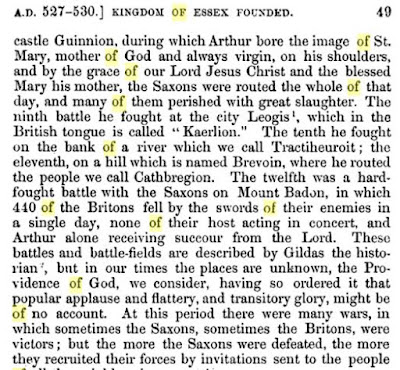Henry of Huntingdon's Historia Anglorum, Decorated initial P, Walters Manuscript W.793, fol. 1r
Produced in the early thirteenth-century, this manuscript is an important textual witness to the Historia Anglorum, the History of the English People, by Henry, archdeacon of Huntingdon. The first version of Henry of Huntingdon’s text had a terminal date of 1129, though there were four more updates containing events through 1135, 1138, 1148 and 1154. Walters W.793 represents the fourth version, covering the events from Britain’s first leaders up to 1148, in which the number of books is increased from eight to ten and three letters by the author were added.
Henry of Huntingdon (https://www.lancaster.ac.uk/staff/haywardp/hist424/seminars/Huntingdon.htm) was an important early writer of English history. His work is especially interesting in that he was a contemporary of Geoffrey of Monmouth.
I have many times pointed out that the legendary Arthur's floruit dovetails very nicely with that of Cerdic of Wessex. Henry noticed the same thing, and so when he discusses Arthur in HISTORIA ANGLORUM, he places his paraphrase of Nennius's Arthur chapter between Cerdic's A.D. 527 Charford battle and the latter's conquest of the Isle of Wight in 530.
What follows are the relevant sections of Henry's text (with the corresponding Latin passages):
...
The Deeds of the Kings of the English was written by the Anglo-Norman monk William of Malmesbury (b. c. 1095, d. c 1143), one of the leading historians of the 12th-century. This historic chronicle traces English history from Roman times until the reign of King Henry I (r. 1100–1135).
William of Malmesbury takes a very different tact when temporally situating the great hero Arthur (https://www.lancaster.ac.uk/staff/haywardp/hist424/seminars/Malmesbury.htm).
"Vortimer, the son of Vortigern thinking it unnecessary longer to dissemble that he saw himself and his Briton circumvented by the craft of the Angles, turned his thoughts to their expulsion, and stimulated his father to the same attempt. At his suggestion, the truce was broken seven years after their arrival; and during the ensuing twenty, they frequently fought partial battles, and, as the [Anglo-Saxon] chronicle relates,, four general actions. From the first conflict they parted on equal terms: one party lamenting the loss of Horsa, the brother of Hengist; the other, that of Katigis, another of Vortigern's sons. The Angles, having the advantage in all the succeeding encounters, peace was concluded; Vortimer, who had been the instigator of the war, and differed far from the indolence of his father, perished prematurely, or he would have governed the kingdom in a noble manner, had God permitted. When he died, the British strength decayed, and all hope fled from them; and they would soon have perished altogether, had not Ambrosius, the sole survivor of the Romans, who became monarch after Vortigern, quelled the presumptuous barbarians by the powerful aid of warlike Arthur. It is of this Arthur that the Britons fondly tell so many fables, even to the present day; a man worthy to be celebrated, not by idle fictions, but by authentic history. He long upheld the sinking state, and roused the broken spirit of his countrymen to war. Finally, at the siege of Mount Badon, relying on an image of the Virgin, which he had affixed to his armor, he engaged nine hundred of the enemy, single-handed, and dispersed them with incredible slaughter."
Some modern historians have been led astray by this account. They have sought to either make Arthur a contemporary of Ambrosius or even to identify Arthur with Ambrosius. Fortunately, I have been able to prove that Ambrosius did not belong to the 5th century, but to the 4th (https://mistshadows.blogspot.com/2021/07/the-ghost-ambrosius-reading-4th-century.html, https://mistshadows.blogspot.com/2020/05/why-ambrosius-aurelianus-was-put-in.html). We may, therefore, wholly discount the notion - expressed above by William of Malmesbury - that Arthur was assisting Ambrosius in the British war against the invading Saxons.











No comments:
Post a Comment
Note: Only a member of this blog may post a comment.